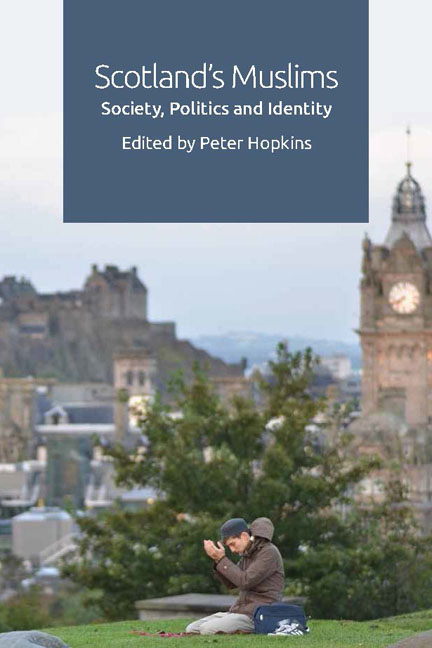Book contents
- Frontmatter
- Contents
- List of Figures and Tables
- Acknowledgements
- Notes on the Contributors
- 1 Introduction Scotland's Muslims: Early Settlement, Current Context and Research Themes
- 2 Health The Health Profile of Muslims in Scotland
- 3 Education Educational Outcomes of Muslim Pupils in Scotland and Parents' Mobilisation of Different Forms of Capital
- 4 Political Participation Young Muslims' Political Interests and Political Participation in Scotland
- 5 Gender and Migration The Role of the ‘Other’ Woman in Shaping the Subjectivities of Recent Muslim Migrant Women to Scotland
- 6 Sexuality Scottish Muslim Gay Men and the Troubling Intersection of Sexuality and Religion
- 7 Young People Muslim Youth in Scotland: Politics, Identity and Multicultural Citizenship
- 8 Generational Relations Gender and Generational Relations for Muslim Women in Scotland
- 9 Heritage Feeling Scottish and Being Muslim: Findings from the Colourful Heritage Project
- 10 Multiculturalism Multiculturalism and Scotland: ‘Bringing the Outside into the Middle’
- 11 Media Muslim Engagement with the Mainstream Media in a Scottish Context
- 12 Representation Representing Islam at the Edinburgh International Book Festival
- 13 Integration Halal Scots: Muslims' Social Integration in Scotland
- Index
5 - Gender and Migration The Role of the ‘Other’ Woman in Shaping the Subjectivities of Recent Muslim Migrant Women to Scotland
Published online by Cambridge University Press: 23 June 2018
- Frontmatter
- Contents
- List of Figures and Tables
- Acknowledgements
- Notes on the Contributors
- 1 Introduction Scotland's Muslims: Early Settlement, Current Context and Research Themes
- 2 Health The Health Profile of Muslims in Scotland
- 3 Education Educational Outcomes of Muslim Pupils in Scotland and Parents' Mobilisation of Different Forms of Capital
- 4 Political Participation Young Muslims' Political Interests and Political Participation in Scotland
- 5 Gender and Migration The Role of the ‘Other’ Woman in Shaping the Subjectivities of Recent Muslim Migrant Women to Scotland
- 6 Sexuality Scottish Muslim Gay Men and the Troubling Intersection of Sexuality and Religion
- 7 Young People Muslim Youth in Scotland: Politics, Identity and Multicultural Citizenship
- 8 Generational Relations Gender and Generational Relations for Muslim Women in Scotland
- 9 Heritage Feeling Scottish and Being Muslim: Findings from the Colourful Heritage Project
- 10 Multiculturalism Multiculturalism and Scotland: ‘Bringing the Outside into the Middle’
- 11 Media Muslim Engagement with the Mainstream Media in a Scottish Context
- 12 Representation Representing Islam at the Edinburgh International Book Festival
- 13 Integration Halal Scots: Muslims' Social Integration in Scotland
- Index
Summary
INTRODUCTION
While much of the literature about Muslim identities has tended to focus on British-born Muslims in densely populated ‘Muslim’ localities, the experiences of Muslim migrants living outside such localities have been largely overlooked. This leaves unanswered questions about the role of ‘other’ women – that is, women from diverse religious, cultural and ethnic backgrounds – in shaping Muslim migrant women's sense of self and their attitudes towards post-migration life. This chapter seeks to address this oversight by exploring the ways in which recent Muslim migrant women to Scotland construct new identities in relation to the ‘other’ women whom they encounter in their post-migration, everyday lives, including friends, neighbours and local community members. Thus, this chapter steps off from what is now a ‘relatively widespread understanding of the self as a relational achievement’ (Conradson and McKay, 2007: 167).
While acknowledging the dangers of juxtaposing the over-determined categories of ‘Muslim’ and ‘non-Muslim’ women in this chapter, this distinction, I argue (perhaps ironically), is necessary to illuminate aspects of sameness between Muslim migrant women and the ‘other’ women. In so doing, I follow Nagel (2005: 13), who suggests, in discussions of Muslim migrants’ assimilation in the West, the importance of identifying ‘commonalities’ between Muslims and non-Muslims ‘rather than only difference and otherness’. Indeed, this chapter seeks to challenge mounting public and political rhetoric about the incompatibility of Muslim women's subject positions, particularly concerning motherhood and work, with life in the West. Drawing on a feminist ethnographic methodology, the analysis and discussion illustrate the relational nature of Muslim migrant women's gendered identities and subjectivities, which are not pre-determined by culture, religion or ethnicity but are always in flux, influenced by an array of new social encounters in day-to-day life. In presenting these insights, this chapter highlights the ongoing negotiation and thus the fluidity of Muslim migrant women's subject positions in a post-migration context.
SETTING THE SCENE: MUSLIM WOMEN, GENDER AND MIGRATION
Over the last fifteen years, a considerable body of work has advanced understandings of Muslim gender relations. In so doing, scholars have sought to undermine the ‘cultural model’, which until recently attributed the high incidence of Muslim women's socioeconomic exclusion in the UK to patriarchal family practices and gender inequality (Dwyer, 1999: 7; see also Ahmad and Sardar, 2012; Aitchison et al., 2007; Hopkins and Gale, 2009).
- Type
- Chapter
- Information
- Scotland's MuslimsSociety, Politics and Identity, pp. 98 - 116Publisher: Edinburgh University PressPrint publication year: 2017

